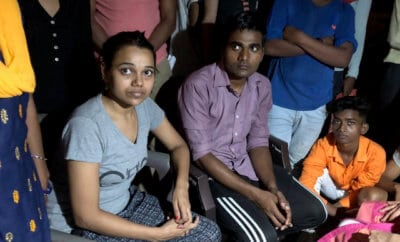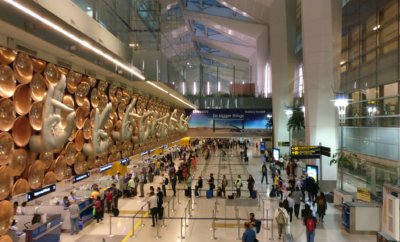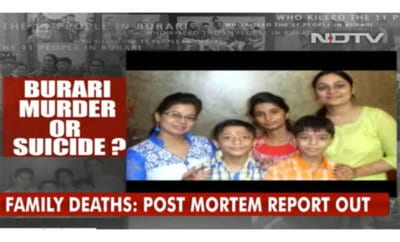Books
Delhi Through Loving Eyes
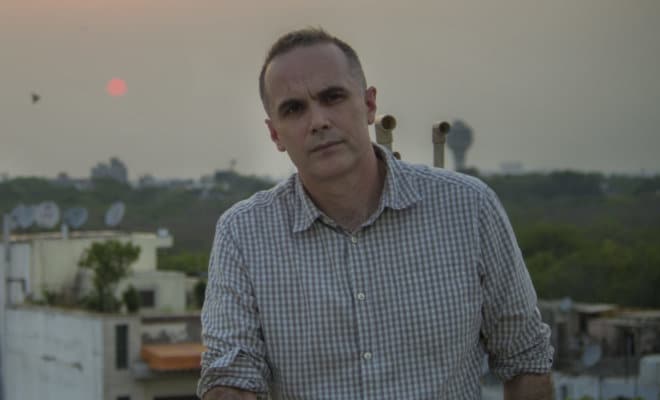
Michael Creighton
India-based American poet Michael Creighton's new book, New Delhi Love Songs, illustrates the sights and sounds of the city "around which the dreams of others orbit.”
Michael Creighton’s book, titled New Delhi Love Songs, is a testament to his love for the street life of India’s capital city. His poems celebrate the common man – rickshaw-pullers, jasmine-sellers, coconut-sellers – on the streets. They describe the daily happenings, dreams and struggles of the different people living in this “extraordinary, segregated city.”
Creighton, who has been living in India with his wife and children since 2005, focuses on the ordinary instead of the extraordinary. In Divinations, he describes the beauty of the Jantar Mantar (the only monument to feature in his poems) but his focus soon shifts to a coconut-seller, who “sits on a wool blanket laid over brown grass and dust” just outside the premises.
Creighton, who hails from Portland, Oregon, in the United States, is a teacher at the American Embassy School in New Delhi. He spoke to Little India about his love for the city, his book, what inspires him to write poetry and more:
How did you decide to settle down in Delhi?
That’s an easy question to answer in a boring way: I got a good job here at the American Embassy School (AES) as a fifth grade teacher; my partner was happy here; and together, we’ve met many interesting people and have seen many interesting things here.
To answer the question in a more interesting way took me a dozen years and book of poems.
What is it about Delhi that you love the most?
Delhi is the city where my partner was born, and where my children spent most of their childhoods. I’m a natural critic, so I’ve never seen it through rose-colored glasses; Delhi has many problems. But I’ve always tried to look at it through loving eyes, because every place and all people deserve that kind of gaze.
One of your poems, To Bhagwan Kumar on the Occasion of His Daughter’s Wedding, talks about what usually happens at a marriage function. What do you think Bhagwan went through at the time?
Like fathers everywhere, I suspect he felt love, pride, and a healthy dose of relief at his daughter’s wedding. But not being inside his head, I can’t be sure — and maybe that’s the way he’d want to it to be.
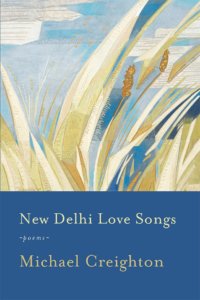
Do you think Bhagwan Kumar was sad to see his daughter leave for a new home, which is why there was no sign of a smile on his face?
Surely, he might have felt that way — I just went to a wedding in a village in Uttar Pradesh in November, and I think I saw the sadness, the worry, that you are talking about when a daughter leaves home. The great thing about a poem — as opposed to an essay, or even a novel — is that poetry doesn’t need to answer all the questions or tie up all the loose ends; in fact, for me, a successful poem often leaves me wondering. Those are often the poems I come back to again and again.
Your poem Escaping Chirag Dilli describes how five boys try to maneuver a cycle-rickshaw on the busy streets of Delhi. What was it about them that caught your eye?
In spite of the fact that so many kinds of people come to this city from so many kinds of places and end up living so close together, in many ways Delhi is an extraordinarily segregated city. People of different classes rarely talk to each other except to bargain over goods and services. In fact, I’d go a step further: we often fail to even see each other. I wonder if this is because to recognize our working class neighbors as fellow humans would obligate us to treat them as human — with rights to things like clean water, good schools, and respect. It would require us to recognize our collective failure to ensure these things.
There is nothing out of the ordinary happening in this poem — this kind of thing happens every day all over the city, because all over the city, all kinds of people struggle, live and dream, just like people everywhere do. But too often we miss this, because we look away — I’m no different, I fail to do this every day. Among other things, for me, poetry is the struggle to see and to touch, to reach across the things that divide all of us from each other, if only for a moment.
What led to the birth of The Community Library Project? What do you strive to achieve through it?
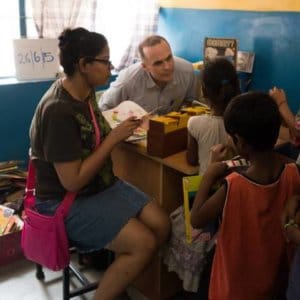
Michael Creighton at a community library he runs in New Delhi
The Community Library Project (TCLP) began as a small, after-school reading club in the Ramditti JR Narang Deepalaya School, way back in 2008. Since then, we have grown a great deal. We now serve hundreds of members every week. We do what good libraries do everywhere: we read aloud to young members and we provide access to books and special programs that are relevant and interesting to our members.
In the past three years, we’ve helped start several libraries in Delhi. Currently, we run one library in collaboration with the Deepalaya and one in collaboration with the NGO Agrasar. TCLP has two main ambitions. First, we strive to run excellent community libraries that encourage reading and thinking among our members. And second, we want our libraries to stand as a provocation to the rest of the city: we have proved that low-cost libraries can and do work, and now we ask, why are there so few of them, even in the nation’s capital?
What is it about Delhi that you dislike the most after having lived here for so many years?
It’s a long way from my family and friends back in Oregon. And though Delhi’s air pollution makes for some interesting images, I think we’d all prefer a little more clean air and blue sky.
What are the similarities and differences between Delhi and Portland?
Well, in terms of similarities, both are cities that I call home, so for me, at least, they are both places I feel a special kind of intimacy with. In terms of differences, there are many, of course. But most interesting to me is the fact that Portland, like many cities, tends to see itself in relation to other places. At times, we imagine ourselves to be the sixth borough of New York City — a west-coast version of Brooklyn. At other times, we see ourselves as a colder, wetter version of San Francisco, or a smaller, cleaner version of Seattle.
Delhi, on the other hand, doesn’t seem to care too much about what other cities think of us. On some level, we understand we are the center around which the dreams of others orbit.
Who has been your inspiration with regard to poetry?
That’s a hard question to answer. I continue to be inspired by many great poets, from William Stafford to Arun Kolatkar. A family friend, the Oregon poet Roger Weaver, encouraged me to work hard at the craft when I first started writing 16 years ago and many others have done so since. But mostly, I’m inspired by the people around me — friends, family, people I meet on the street — and by the questions they provoke in me.
Reading and writing are ways to explore the questions that matter to us. Some of those questions are universal and even ‘political’: the nature of injustice, the ways we are all alike and different from other people; the limitations and possibilities of language and our ability to see. Some questions are more personal: our own experience with love, grief and faith, for example. Poetry — the reading and writing of it — is just one way to examine those questions, but it’s worked for me so far, so I keep at it.

